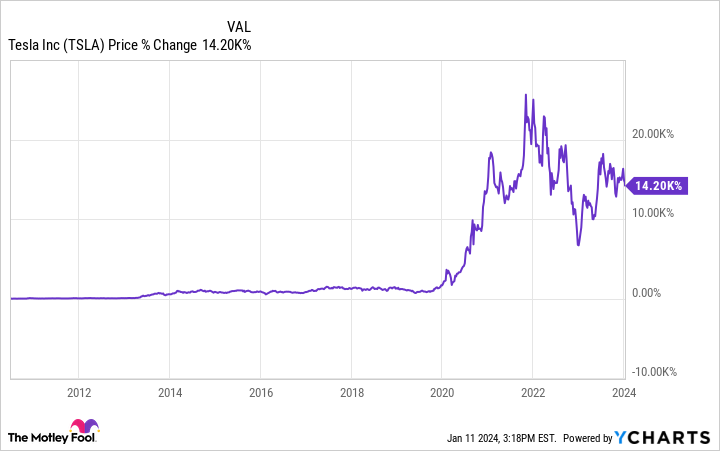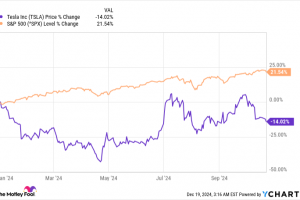
One of the most visible big-name investors on Wall Street is Ark Invest CEO Cathie Wood. Wood invests in many areas of emerging technology including artificial intelligence (AI) and genomics.
But perhaps Wood’s most bullish stance revolves around electric vehicle (EV) company Tesla (NASDAQ: TSLA). Wood has been a longtime supporter of Tesla’s eccentric CEO Elon Musk who shares his vision of the company spanning beyond EV production.
Given the company’s inroads with autonomous driving and robotics, Wood recently referred to Tesla as the biggest AI play in the world. To back up her claim, Wood’s research suggests that Tesla stock could grow by another 777% over the next three to four years.
Let’s dig into the state of Tesla’s operation and assess if Wood’s price target is feasible.
Tesla’s incredible run
Since its initial public offering (IPO) in 2010, Tesla’s stock price has risen over 14,000%.
TSLA Chart
While that makes Tesla one of the best-performing stocks in recent history, the chart above illustrates that the journey has been anything but linear. While Tesla has garnered its share of institutional support from the likes of Wood and mutual fund manager Ron Baron, the company is also a favorite among retail investors. A lot of that has to do with Musk’s infatuation with meme culture and his large presence on social media.
Nevertheless, despite some controversies, Musk and his team have always found a way to deliver. As such, confidence in Tesla has gradually risen and the company is now one of the world’s largest enterprises by market cap.
Given this stunning growth, Tesla stock has experienced periods of more pronounced buying activity and its valuation has become overextended. To mitigate some of this, Tesla has undergone two stock splits in the last four years — once in 2020 and another in 2022.
While stock splits do not inherently change the value of a company, seasoned investors probably understand that more investors tend to buy in after these events occur. This is usually due to a psychological perception that the stock is cheaper given its now lower share…
..






